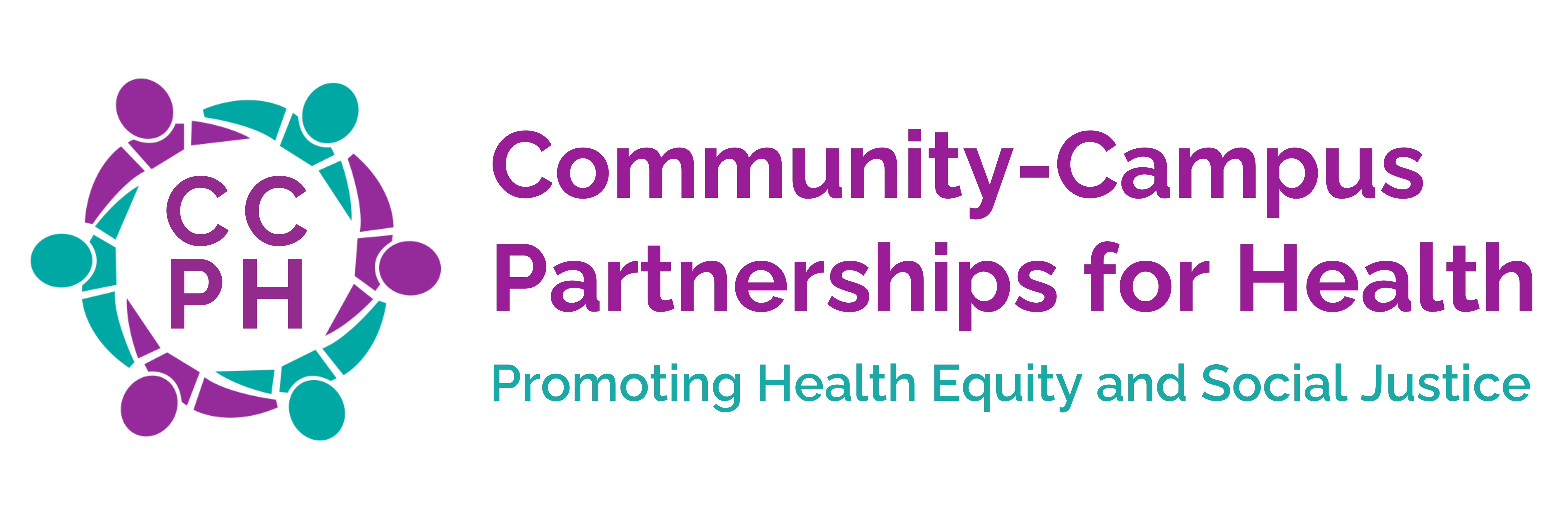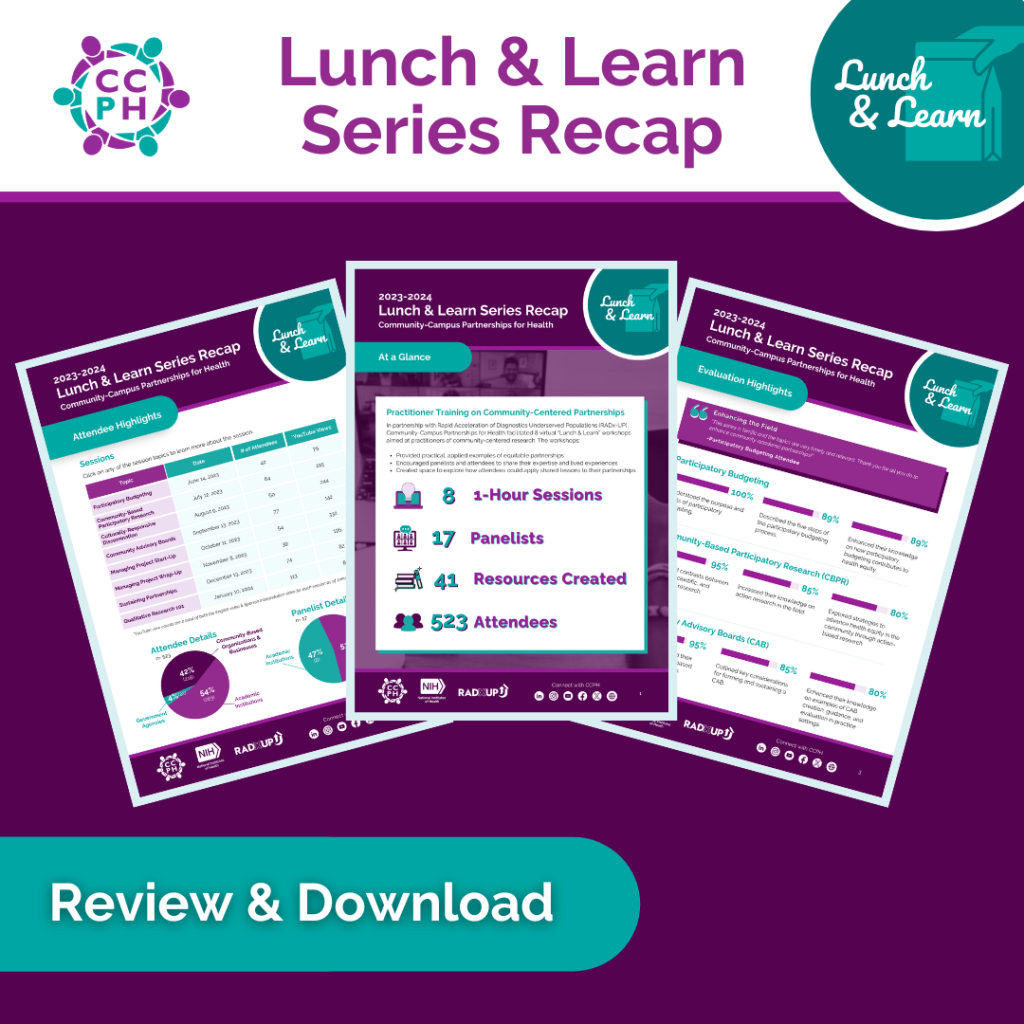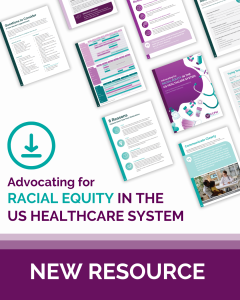This national convening introduced the RADx-UP Public Health Emergency Preparedness Playbook, where expert panelists shared insights on how to effectively apply the RADx-UP Playbook in real-world settings. This session introduced the RADx-UP project and how resources were compiled into a playbook to guide a community-engaged approach for pandemic response. The purpose was to help spread the playbook lessons to local networks and communities.
This webinar had a Spanish language and ASL interpretation, and recordings are publicly available in both English and Spanish interpretation.
Watch the recording in English.
Watch the recording in Spanish.
Event Reflections
What was the purpose of the event?
The convening aimed to introduce the RADx-UP Public Health Emergency Preparedness Playbook, a central legacy output from the RADx-UP initiative. The event provided space to highlight strategies for equity-centered emergency response, showcase community-academic partnerships, and emphasize the importance of community-led approaches in public health preparedness.
What did attendees gain from attending this event?
Attendees learned about the origins and structure of the Playbook, gained insight into how the CDCC curated over 400 community-informed resources, and used participatory methods to develop and review them. Panelists offered insights on how to integrate these tools into their community, and how they translate into action. They also heard directly from community and academic leaders about lessons learned and strategies to sustain trust-based partnerships in future emergencies.
What resources were shared at this event?
- The RADx-UP Public Health Emergency Preparedness Playbook is organized into four major sections and nine chapters. An asset index of over 400 resources was reviewed by members of RADx-UP’s community task force. This team prioritized the best public-use assets and pared down the essential resources (approximately 170) to include in the Playbook.
- Attendees also received panelist insights and real-world applications, and information on accessing the Playbook online and plans for a searchable public platform
What are the next steps from this event?
Next steps include:
- Final dissemination of the Playbook and legacy tools in accessible formats
- Encouraging partners to incorporate these materials into their emergency preparedness and community engagement efforts
- Supporting continued community-led storytelling, evaluation, and policy advocacy
How does the partners’ mission connect to the work CCPH does?
The mission of RADx-UP to advance health equity in underserved communities through improved access to diagnostics and research aligns closely with CCPH’s core values of equity, trust, and community-led collaboration. As a partner in RADx-UP, CCPH provided technical assistance, supported capacity building, and co-developed resources, such as the Playbook, furthering its commitment to promoting social justice through strong community-academic partnerships.
Panelists

Angella Dunston, MDiv
Community Advocate, Community Partnership Coach
Angella Dunston is a servant leader with a heart for people. She is a dedicated community change champion and policy advocate who has a demonstrated history of working to bring about effective statewide change in the nonprofit and government sector. She began her training in environmental justice fighting as an activist for the removal of toxic cancerous chemicals dumped in rural Warren County, where she grew up. She is the Director of Community Engagement and Advocacy for Dunston Leadership Consulting; in that role, she ensures that low-income communities are provided a seat at the decision-making table alongside government leaders, as well as public- and private- sector representatives.
Dunston previously served as Director of Community and Faith-Based Outreach for former Gov. Beverly Perdue. In that role, she was responsible for building a network of statewide advocates that included black, indigenous, and people of color (BIPOC) and the faith-based community. For more than 10 years, she was director of the Education and Law Project at the NC Justice Center. Dunston currently serves as the co-chair of fund development on the Board of Lillian’s List, which supports progressive women running for legislative office, and on the advisory council for Volunteers of America Carolina Council. She is a professional with more than 20 years of experience in government relations, community engagement, and social advocacy. She has expansive skills in leadership development, diversity, equity, and inclusion, and is currently utilizing those skills to bring about effective change and enhance community impact in North Carolina. Dunston is a proud mom and aspiring author. In her spare time, she takes care of her loving family, which includes a Pomeranian pup named Mr. Polo “THE Personality.”

Janet Appling-Kasper
Director of Community Impact, United Way of Merced County California
Janet Appling‑Kasper is an experienced community leader, entrepreneur, and retired civil servant whose career spans project development, program administration, and community engagement across nonprofit and government sectors. Currently serving as Director of Community Impact at United Way of Merced County, she has a strong track record of coordinating large-scale volunteer initiatives through Merced County Human Services—overseeing programs supporting seniors, foster youth, veterans, and health insurance counseling. With a passion for leveraging trusted local networks—from food distribution events to barbershops—to amplify public health messaging, Janet is a versatile leader who blends strategic insight with hands-on community engagement to drive meaningful, equitable impact.












